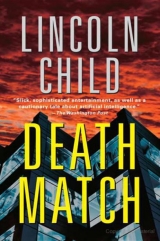
Текст книги "Death Match"
Автор книги: Lincoln Child
Соавторы: Lincoln Child
Жанр:
Триллеры
сообщить о нарушении
Текущая страница: 1 (всего у книги 26 страниц)
Lincoln Child
Death Match
To Veronica
ACKNOWLEDGMENTS
Many people lent their expertise to the writing of this book. I’d like to thank my friend and editor at Doubleday, Jason Kaufman, for his assistance in countless ways, large and small. Thanks also to his colleagues, Jenny Choi and Rachel Pace.
Kenneth Freundlich, Ph.D., provided invaluable insight into psychological testing and administration. Thanks also to Lee Suckno, M.D., Antony Cifelli, M.D., Traian Parvulescu, M.D., and Daniel DaSilva, Ph.D., for their medical and psychological expertise. Cezar Baula and Chris Buck helped with chemical and pharmaceutical details. Once again, my cousin Greg Tear was both a vital sounding board and a fount of ideas. And ongoing thanks to Special Agent Douglas Margini for his assistance with law enforcement aspects of the book.
A special thanks to Douglas Preston for his support and encouragement throughout the writing of this book, and for supplying a crucial chapter.
I’d also like to thank Bruce Swanson, Mark Mendel, and Jim Jenkins, for their guidance and friendship.
Last, I want to thank those without whom my novels could never exist: my wife, Luchie; my daughter, Veronica; my parents, Bill and Nancy; and my siblings, Doug and Cynthia.
It goes without saying that the characters, corporations, events, locales, entities, pharmaceutical products, psychological apparatus, governmental bodies, computing devices, and the rest of the clay out of which this novel was fashioned are all fictitious, or are used fictitiously. The Eden Incorporated of this book – though it may exist some day – is at present a caprice of my imagination.
ONE
It was the first time Maureen Bowman had ever heard the baby cry.
She hadn’t noticed right away. In fact, it had taken five, perhaps ten minutes to register. She’d almost finished with the breakfast dishes when she stopped to listen, suds dripping from her yellow-gloved hands. No mistake: crying, and from the direction of the Thorpe house.
Maureen rinsed the last dish, wrapped the damp towel around it, and turned it over thoughtfully in her hands. Normally, the cry of a baby would go unnoticed in her neighborhood. It was one of those suburban sounds, like the tinkle of the ice cream truck or the bark of a dog, that passed just beneath the radar of conscious perception.
So why had she noticed? She dropped the plate into the drying rack.
Because the Thorpe baby never cried. In the balmy summer days, with the windows thrown wide, she’d often heard it cooing, gurgling, laughing. Sometimes, she’d heard the infant vocalizing to the sounds of classical music, her voice mingling in the breeze with the scent of piñon pines.
Maureen wiped her hands on the towel, folded it carefully, then glanced up from the counter. But it was September now; the first day it really felt like autumn. In the distance, the purple flanks of the San Francisco peaks were wreathed in snow. She could see them, through a window shut tight against the chill.
She shrugged, turned, and walked away from the sink. All babies cried, sooner or later; you’d worry if they didn’t. Besides, it was none of her business; she had plenty of things to take care of without messing in her neighbors’ lives. It was Friday, always the busiest day of the week. Choir rehearsal for herself, ballet for Courtney, karate for Jason. Andit was Jason’s birthday; he’d demanded beef fondue and chocolate cake. That meant another trip to the new supermarket on Route 66. With a sigh, Maureen pulled a list from beneath a refrigerator magnet, grabbed a pencil from the phone stand, and began scrawling items.
Then she stopped. With the windows all closed, the Thorpe baby must really be cranking if she could hear…
Maureen forced the thought from her mind. The infant girl had barked her shin or something. Maybe she was becoming colicky, it wasn’t too late for that. In any case, the Thorpes were adults; they could deal with it. The Thorpes could deal with anything.
This last thought had a bitter undertone, and Maureen was quick to remind herself this was unfair. The Thorpes had different interests, ran in different circles; that was all.
Lewis and Lindsay Thorpe had moved to Flagstaff just over a year before. In a neighborhood full of empty nesters and retirees, they stood out as a young, attractive couple, and Maureen had been quick to invite them to dinner. They’d been charming guests, friendly and witty and very polite. The conversation had been easy, unforced. But the invitation had never been returned. Lindsay Thorpe was in her third trimester at the time; Maureen liked to believe that was the reason. And now, with a new baby, back full-time at work… it was all perfectly understandable.
She walked slowly across the kitchen, past the breakfast table, to the sliding glass door. From here, she had a better view of the Thorpes’. They’d been home the night before, she knew; she’d seen Lewis’s car driving past around dinnertime. But now, as she peered out, all seemed quiet.
Except for the baby. God, the little thing had leather lungs…
Maureen stepped closer to the glass, craning her neck. That’s when she saw the Thorpes’ cars. Both of them, twin Audi A8s, the black one Lewis’s and the silver one Lindsay’s, parked in the breezeway.
Both home, on a Friday? This was seriously weird. Maureen pressed her nose up against the glass.
Then she stepped back. Now listen, you’re being exactly the kind of nosy neighbor you promised you’d never be. There could be any number of explanations. The little girl was sick, the parents were home to tend to her. Maybe grandparents were arriving. Or they were getting ready to go on vacation. Or…
The child’s cries had begun to take on a hoarse, ragged quality. And now, without thinking, Maureen put her hand on the glass door and slid it open.
Wait, I can’t just go over there. It’ll be nothing. I’ll embarrass them, make myself look like a fool.
She looked over at the counter. The night before, she’d baked an enormous quantity of tollhouse cookies for Jason’s birthday. She’d bring some of those over; that was a reasonable, neighborly thing to do.
Quickly, she grabbed a paper plate – thought better of it – replaced it with a piece of her good china, arranged a dozen cookies on it, and covered them with plastic wrap. She scooped up the plate, made for the door.
Then she hesitated. Lindsay, she remembered, was a gourmet chef. A few Saturdays before, when they’d met at their mailboxes, the woman had apologized for being unable to chat because she had a burnt-almond ganache boiling on the stove. What would they think of a homely plate of tollhouse cookies?
You’re thinking about this way, way too much. Just go on over there.
What was it, exactly, she found so intimidating about the Thorpes? The fact they didn’t seem to need her friendship? They were well educated, but Maureen had her own cum laude degree in English. They had lots of money, but so did half the neighborhood. Maybe it was how perfect they seemed together, how ideally suited to each other. It was almost uncanny. That one time they’d come over, Maureen had noticed how they unconsciously held hands; how they frequently completed each other’s sentences; how they’d shared countless glances that, though brief, seemed pregnant with meaning. “Disgustingly happy” was how Maureen’s husband termed them, but Maureen didn’t think it disgusting at all. In fact, she’d found herself feeling envious.
Steadying her grip on the plate of cookies, she walked to the door, pulled back the screen, and stepped outside.
It was a beautiful, crisp morning, the smell of cedar strong in the thin air. Birds were piping in the branches overhead, and from down the hill, in the direction of town, she could hear the mournful call of the Southwest Chief as it pulled into the train station.
Out here, the crying was much louder.
Maureen strode purposefully across the lawn of colored lava and stepped over the border of railroad ties. This was the first time she’d actually set foot on the Thorpes’ property. It felt strange, somehow. The backyard was enclosed, but between the boards of the fence she could make out the Japanese garden Lewis had told them about. He was fascinated by Japanese culture, and had translated several of the great haiku poets; he’d mentioned some names Maureen had never heard of. What she could see of the garden looked tranquil. Serene. At dinner that night, Lewis had told a story about the Zen master who’d asked an apprentice to tidy his garden. The apprentice had spent all day at it, removing every last fallen leaf, sweeping and polishing the stone paths until they gleamed, raking the sand into regular lines. At last, the Zen master had emerged to scrutinize the work. “Perfect?” the apprentice asked as he displayed the meticulous garden. But the master shook his head. Then he gathered up a handful of pebbles and scattered them across the spotless sand. “ Nowit is perfect,” he replied. Maureen remembered how Lewis’s eyes had sparkled with amusement as he told the story.
She hurried forward, the crying strong in her ears.
Ahead was the Thorpes’ kitchen door. Maureen stepped up to it, carefully arranged a bright smile on her face, and pulled open the screen. She began to knock, but with the pressure of her first rap the door swung inward.
She took a step.
“Hello?” she said. “Lindsay? Lewis?”
Here, in the house, the wailing was almost physically painful. She hadn’t known an infant could cry so loud. Wherever the parents were, they certainly couldn’t hear her over the baby. How could they be ignoring it? Was it possible they were showering? Or engaged in some kinky sex act? Abruptly, she felt self-conscious, and glanced around. The kitchen was beautiful: professional-grade appliances, glossy black counters. But it was empty.
The kitchen led directly into a breakfast nook, gilded by morning light. And there was the child: up ahead, in the archway between the breakfast nook and some other space that, from what she could see, looked like a living room. The infant was strapped tightly into her high chair, facing the living room. The little face was mottled from crying, and the cheeks were stained with mucus and tears.
Maureen rushed forward. “Oh, you poor thing.” Balancing the cookies awkwardly, she fished for a tissue, cleaned the child’s face. “There, there.”
But the crying did not ease. The baby was pounding her little fists, staring fixedly ahead, inconsolable.
It took quite some time to wipe the red face clean, and by the time she was done Maureen’s ears were ringing with the noise. It wasn’t until she was pushing the tissue back into the pocket of her jeans that she thought to follow the child’s line of sight into the living room.
And when she did, the cry of the child, the crash of china as she dropped the cookies, were instantly drowned by the sound of her screams.
TWO
Christopher Lash stepped out of the cab and into the tumult of Madison Avenue. It had been half a year since he was last in New York, and those months seemed to have softened him. He hadn’t missed the acrid diesel plumes belching from serried rows of buses; he’d forgotten the unpleasantly burnt aroma of the sidewalk pretzel stands. The throngs of passersby, barking into cell phones; the blat of horns; the angry interplay of cars and trucks – it all reminded him of the frantic, senseless activity of an ant colony, exposed from beneath a rock.
Taking a firm grip on his leather satchel, he stepped onto the sidewalk and inserted himself deftly into the crowds. It had been a long time, too, since he’d carried the satchel, and it felt foreign and uncomfortable in his hand.
He crossed Fifty-seventh Street, letting himself be carried along by the river of humanity, and headed south. Another block, and the crowds eased somewhat. He crossed Fifty-sixth, then slid into an empty doorway, where he could pause a moment without being jostled. Placing his satchel carefully between his shoes, he gazed upward.
Across the street, a rectangular tower rose into the sky. There was no number, or corporate lettering, to betray what lay within. They were rendered unnecessary by the logo that – thanks to countless high-profile news reports – had recently become almost as familiar an American icon as the golden arches: the sleek, elongated infinity symbol that hovered just above the building’s entrance. The tower rose to a setback, halfway up its massive flank; higher, decorative latticework ran around the structure like a ribbon, setting off the top few floors. But this simplicity was deceptive. The tower’s skin had a richness, a sense of depth, almost like the paintwork on the most expensive of cars. Recent architectural textbooks called the building “obsidian,” but that wasn’t quite correct: it had a warm, pellucid glow that seemed almost drawn from its environment, leaving the surrounding buildings cold and colorless by comparison.
Dropping his gaze from the facade, he fished into the pocket of his suit jacket and pulled out a piece of business stationery. At the top, “Eden Incorporated” was embossed in elegant type beside the infinity logo; “deliver by courier” was stamped at the bottom. He reread the brief message below.
Dear Dr. Lash:
I enjoyed speaking with you today, and I’m glad you could come on such short notice. We’ll expect you Monday at 10:30 a.m. Please give the enclosed card to one of the security personnel in the lobby.
Sincerely,
Edwin Mauchly
Director, Facilitation Services
The letter yielded up no more information than it had the other times he’d read it, and Lash returned it to his pocket.
He waited for the light to change, then picked up his satchel and made his way across the street. The tower was set back extravagantly from the sidewalk, creating a welcoming oasis. There was a fountain here: marble satyrs and nymphs disporting themselves around a bent, ancient figure. Lash peered curiously through the curtain of mist at the figure. It seemed a strange centerpiece for a fountain: no matter how he stared, he could not quite determine whether it was male or female.
Beyond the fountain, the revolving doors were kept in constant motion. Lash stopped again, observing this traffic intently. Almost everyone was entering, not leaving. But it was almost ten-thirty, so it couldn’t be employees he was seeing. No, they must all be clients; or, more likely, would-be clients.
The lobby was large and high-ceilinged, and he paused again just inside. Although the surfaces were of pink marble, indirect lighting lent the space an unusual warmth. There was an information desk in its center, of the same obsidian as the building’s exterior. Along the right wall, beyond a security checkpoint, lay a long bank of elevators. New arrivals continued to stream by him. They were a remarkably heterogeneous crowd: all ages, races, heights, builds. They looked hopeful, eager, perhaps a little apprehensive. The excitement in the air was palpable. Some headed toward the far end of the lobby, where twin escalators climbed toward a wide, arched passage. CANDIDATE PROCESSING was engraved above the passage in discreet gold lettering. Others were moving toward a set of doors below the escalators marked APPLICATIONS. And still others had gravitated to the left side of the lobby, where Lash caught the flicker of myriad movements. Curious, he drifted closer.
Across a wide swath of the left wall, floor to ceiling, large flatscreen plasma displays had been set edge to edge in a huge matrix. On each screen was the head shot of a different person, talking to the camera: men and women, old and young. The faces were so different from each other that, for a moment, Lash sensed but could not place the commonality they shared. Then he realized: every face was smiling, almost serene.
Lash joined the crowd who had assembled, mute and staring, before the wall of faces. As he did so, he became aware of countless voices, apparently coming from speakers hidden among the screens. Yet through some trick of sound projection, he found it easy to isolate individual voices in three-dimensional space, to match them with faces on the screens. It completely turned my life around, a pretty young woman on one of the screens was saying, seeming to speak directly to him. If it wasn’t for Eden, I don’t know what I would’ve done, a man on another told him, smiling almost confidentially, as if imparting a secret. It’s made all the difference. On yet another screen, a blond man with pale blue eyes and a brilliant smile said, It’s the best thing I’ve ever done. Period. End of story.
As he listened, Lash became aware of another voice: low, just on the edge of audibility, little more than a whisper. It was not coming from any of the screens, but seemingly from all around. He paused to listen.
Technology, the voice was saying. Today, it’s used to make our lives easier, longer, more comfortable. But what if technology could do something even more profound? What if it could bring completion, bring utter fulfillment?
Imagine computer technology so advanced it could reconstruct – virtually – your own personality, the essence of what makes you unique: your hopes, desires, dreams. The inmost needs that not even you may be aware of. Imagine a digital infrastructure so robust it could contain this personality construct of yours – with its countless unique facets and characteristics – along with those of many, many other people. Imagine an artificial intelligence so profound it could compare your construct with these multitudes of others, and – in an hour, a day, a week – find that one person, that sole individual, that is your perfect match. Your ideal soulmate, uniquely fitted by personality, background, interests, countless other benchmarks to be your other half. To make your life complete. Not just two people who happen to share a few interests. But a match where one person complements the other in ways so profound, so subtle, it could never be imagined or anticipated.
Lash continued to watch the endless sea of faces before him while listening to the disembodied, sonorous voice.
No blind dates, it went on. No singles parties, where your choice is limited to a handful of random meetings. No evenings wasted on incompatibility. Rather, a proprietary system of profound sophistication. This system is now. And the company is Eden.
The service is not cheap. But if there is even the slightest dissatisfaction, Eden Incorporated offers a full refund, guaranteed for life. Yet out of the many, many thousands of couples Eden has brought together, not one has requested a refund. Because these people – like those on the screens before you – have learned there is no price that can be put on happiness.
With a start, Lash looked away from the screens and down at his watch. He was five minutes late for his appointment.
Walking across the lobby, Lash drew out a card and handed it to one of the uniformed guards. He was given a signed pass and cheerfully directed toward the bank of elevators.
Thirty-two stories above, Lash stepped into a small but elegant reception area. The tones were neutral, and there was the faintest rush of industrial pink noise. There were no signs, directories, formal guides of any kind: just one desk of polished blond wood, an attractive woman in a business suit behind it.
“Dr. Lash?” she asked with an engaging smile.
“Yes.”
“Good morning. May I see your driver’s license, please?”
This request was so strange that Lash did not think to question it. Instead, he pulled out his wallet and fished for his license.
“Thank you.” The woman held it briefly over some scanning apparatus. Then she handed it back with another bright smile, rose from her chair, and motioned him toward a door in the far wall of the reception area.
They passed down a long corridor, similar in decor to the room they’d just left. Lash noticed many doors, all unlabeled, all closed. The woman stopped before one of them.
“In here, please,” she said.
As the door closed behind him, Lash looked around at a well-appointed room. A desk of dark wood sat upon a dense carpet. Several paintings hung on the walls, beautifully framed. Behind the desk, a man now rose to greet him, smoothing his brown suit as he did so. Lash shook the proffered hand, typing the man from old habit as he did so. He looked to be in his late thirties: fairly short, dark complexion, dark hair, dark eyes, muscular but not stocky. Swimmer, perhaps, or tennis player. His bearing spoke of someone self-confident, considered; a man who would be slow to act but, when acting, do so decisively.
“Dr. Lash,” the man said, returning his gaze. “I’m Edwin Mauchly. Thanks for coming.”
“Sorry I’m late.”
“Not at all. Take a seat, please.”
Lash sat down in the lone leather chair that faced the desk while Mauchly turned toward a computer monitor. He typed for a moment, then stopped. “Give me just a minute here, please. It’s been four years since I gave an entrance interview, and the screens have changed.”
“Is that what this is?”
“Of course not. But there’s some similar initial processing to be done.” He typed again. “Here we are. The address of your Stamford office is 315 Front Street, Suite 2?”
“Yes.”
“Good. If you could just fill out this information for me, please.”
Lash scanned the white card that was slid across the desk: date of birth, social security number, half a dozen other mundane details. He took a pen from his pocket and began jotting on the form.
“You used to give entrance interviews?” he said as he wrote.
“I helped design the process, as an employee of PharmGen. That was early on, before Eden became an independent company.”
“What’s it like?”
“What is what like, Dr. Lash?”
“Working here.” He slid the card back. “You’d think it would be magic. Listening to all those testimonials in the lobby, anyway.”
Mauchly glanced at the card. “I don’t blame you for being skeptical.” He had a face that managed to look both candid and reticent at the same time. “Two people’s feelings for each other, what can technology do about that? But ask any of our employees. They see it work, time after time, everytime. Yes, I guess magic is as good a word for it as any.”
On the far side of the desk, a telephone rang. “Mauchly,” the man said, tucking the phone beneath his chin. “Very well. Good-bye.” He replaced the phone, then rose. “He’s ready for you, Dr. Lash.”
He?Lash thought to himself as he picked up his satchel. He followed Mauchly back out into the corridor, to an intersection, then into a wider, plushly appointed hallway that ended in a set of brilliantly polished doors. Reaching them, Mauchly paused, then knocked.
“Come in,” came a voice from beyond.
Mauchly opened the door. “I’ll speak with you again shortly, Dr. Lash,” he said, motioning him inside.
Lash stepped forward, then stopped again as the door clicked closed. Before him stood a long, semicircular table of dark wood. Across it sat a lone man, tall and deeply tanned. He smiled, nodded. Lash nodded back. And then, with a sudden shock of recognition, he realized the man was none other than John Lelyveld, chairman of Eden Incorporated.
Waiting for him.








